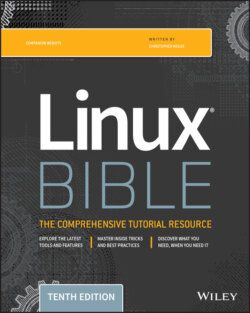Читать книгу Linux Bible - Christopher Negus - Страница 167
Using ‘not' and ‘or' when finding files
ОглавлениеWith the -not and -or options, you can further refine your searches. There may be times when you want to find files owned by a particular user but not assigned to a particular group. You may want files larger than a certain size but smaller than another size. Or you might want to find files owned by any of several users. The -not and -or options can help you do that. Consider the following examples:
There is a shared directory called /var/allusers. This command line enables you to find files that are owned by either joe or chris. $ find /var/allusers \( -user joe -o -user chris \) -ls 679967 0 -rw-r--r-- 1 chris chris 0 Dec 31 12:57 /var/allusers/myjoe 679977 1812 -rw-r--r-- 1 joe joe 4379 Dec 31 13:09 /var/allusers/dict.dat 679972 0 -rw-r--r-- 1 joe sales 0 Dec 31 13:02 /var/allusers/one
This command line searches for files owned by the user joe, but only those that are not assigned to the group joe: $ find /var/allusers/ -user joe -not -group joe -ls 679972 0 -rw-r--r-- 1 joe sales 0 Dec 31 13:02 /var/allusers/one
You can also add multiple requirements on your searches. Here, a file must be owned by the user joe and must also be more than 1MB in size: $ find /var/allusers/ -user joe -and -size +1M -ls 679977 1812 -rw-r--r-- 1 joe root 1854379 Dec 31 13:09 /var/allusers/dict.dat
